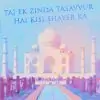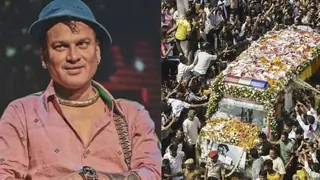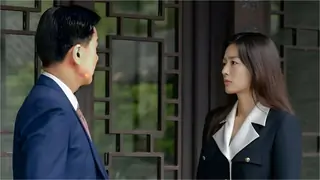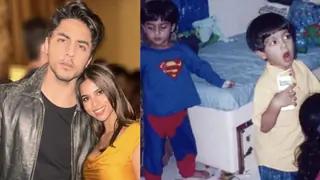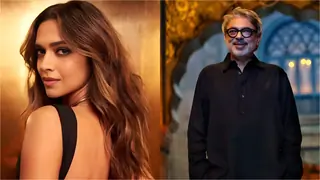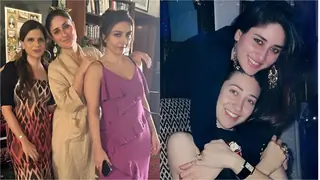All music lovers of Hindi Film songs should be highly indebted to the Great Music Directors of the Golden Era of 1950s and 1960s. Most of these music directors left a treasure of melodious songs behind them, which we still want to listen and enjoy even after 50 years. Many movies of the golden era have been long forgotten, yet the songs of these old movies still linger on to entertain us over and over again. There are lots of inside stories associated with these old music directors.
This article is based on what I read in various magazines on film music, various radio and TV interviews.
Shankar - Jaikishen
Popularly known as SJ, they were considered to be the magicians of swaras. They were the most prolific in composing variety of songs with almost no repetition. Almost every song of every movie, which was composed by this duo, was a super hit. SJ were responsible for bringing in more than 200 instrumentalists to support a song. In the 1940s, before SJ arrived on the scene, there used to be only 4 to 5 musicians to accompany a song. SJ were the trendsetters, and most of the time, other music directors had to follow this SJ trend or opt out from music industry.
When the song 'Kahan jaa raha hai' from Film Seema was recorded in Rafi's voice, in the final antara of the song '…Vo kyun tod daale', his voice cracked while rendering the word 'tod'. Normally, any such discrepancy would be removed and the song re-recorded. Shankar ordered that this song be re-recorded. But Jaikishen intervened and told Shankar to retain this song with the cracked voice at the word 'tod'. Since this song was being picturized for a tragic sequence, it would be very effective if this cracked voice was retained, Jaikishen reasoned. This was finally accepted by Shankar and this song with the discrepancy was retained as the final version. Those who saw this movie can see for themselves how effective Jaikishen's decision was.
At the time of recording of 'Pyar huwa, ikraar huwa' (Film: Shri 420), sthaayi (beginning piece) of this song was composed by Shankar and antara (middle piece) was composed by Jaikishen. Later, Shankar wanted to change the antara composed by Jaikishen, which Jaikishen vehemently opposed. Finally, this confrontation led to fist fight between the two greats. Only the timely intervention by other musicians calmed down both of them and finally Shankar agreed to retain Jaikishen's composition of antara 'as is'. We all know this song is very popular even today and the best rain song composed ever.
When the song 'Mujhe tumse kuch bhi na chaahiye' from Film Kanhaiyaa was being composed, one of Jaikishen's beloved uncles had just died. Jaikishen was in a very sad mood. He instructed lyricist Hasrat Jaipuri to write the lyrics that will express Jaikishen's sad feelings at the time. Hasrat Jaipuri did justice by penning down appropriate sad words. Jaikishen set the tune in raga Darbari. And all of us know how sad we get when we listen to this song, especially when we listen to the lyrics 'Mujhe mere haal pe chod do'. In reality, this song represents the sadness Jaikishen felt at the time of composing this song.
When film Sangam was released, in the beginning, the song 'Dost dost na raha' composed by Shankar topped the music popularity charts far ahead of another song 'Ye mera prempatra padhkar' composed by Jaikishen. At a weekend music party hosted by Raj Kapoor to celebrate the success of Sangam, one of the guests asked Jaikishen why his song was lagging far behind Shankar's in the popularity charts. Jaikishen told him to wait for few more weeks and check the charts again. Later, the same guest approached Shankar and told him what Jaikishen had just said. Shankar was furious at Jaikishen's remark. This was really a battle royal of Shankar vs Jaikishen. Few weeks later, as Jaikishen had predicted, his song 'Ye mera prempatra padhkar' topped the popularity charts far ahead of Shankar's 'Dost dost na raha'. Personally, I like both the songs.
Once, in early 1950s, Lata had refused to sing the song 'Main baharon ki natkhat rani' (Film: Boot Polish), because initially the lyrics were 'bazaron ki', which was objectionable to Lata. So it was changed to 'baharon ki' for Lata's sake. Even then Lata would not budge and continued her refusal to sing the song, and finally SJ had to record this song using Asha's voice.
When superhit song 'Main kya karoon ram mujhe buddha mil gaya' was being composed at the behest of Raj Kapoor, because of the earlier incidence, SJ were worried that Lata would refuse to sing this song because of the lyrics. Lata always used to be very particular about the lyrics of the songs before recording. And Raj Kapoor wanted SJ to record this song as quickly as possible with Lata as the singer. SJ decided to trick Lata. So, SJ telephoned Lata and told her that a quick picturization of a song for Sangam had to be done at RK studios, and that she should come immediately and record the song without much rehearsal. So Lata came hurriedly and the song was quickly recorded before giving any time to Lata to grasp the meaning of the lyrics. We all know how much fun this song brought to the audience when beautiful Vyjayantimala danced to the tune, teasing aging Raj Kapoor.
Song 'Rasik Balma' (Film: Chori Chori) was so much liked by famous producer Mehboob Khan that when he was hospitalized in Los Angeles, since the record was not available in the US at that time, he telephoned Lata in Mumbai and asked her to sing this song over the telephone. Listening to this song brought Mehboob Khan a great solace while he was still recuperating in the hospital. And thereafter, Lata sang this song for him over the telephone for many more days. Hats off to Jaikishen who composed such a great tune.
In the late 1960s, Shankar and Jaikishen were breaking apart because of Shankar's excessive insistence to take singer Sharda in place of Lata, which Jaikishen never liked. Although SJ continued to give music together, they were really competing against each other. Finally, differences grew up so much that Raj Kapoor literally had to pull both of them together to compose music for his film Mera Naam Joker of 1970. Later, Shankar and Jaikishen took independent contracts as music directors although they still continued to give combined SJ name. For instance, in film Andaz of 1971, music was completely composed by Jaikishen, yet in the film credit, the name Shankar-Jaikishen was retained. Film Andaaz was Jaikishen's last film. Jaikishen died on 12th Sept.1971.
After the death of Jaikishen, Shankar continued to compose music under the banner name Shankar-Jaikishen, but with the exception of his music for the film Lal Pathar (1976), Shankar's music failed miserably. Maybe after Shankar lost his soulmate Jaikishen, he could not compose properly. Shankar died later in 1987.












